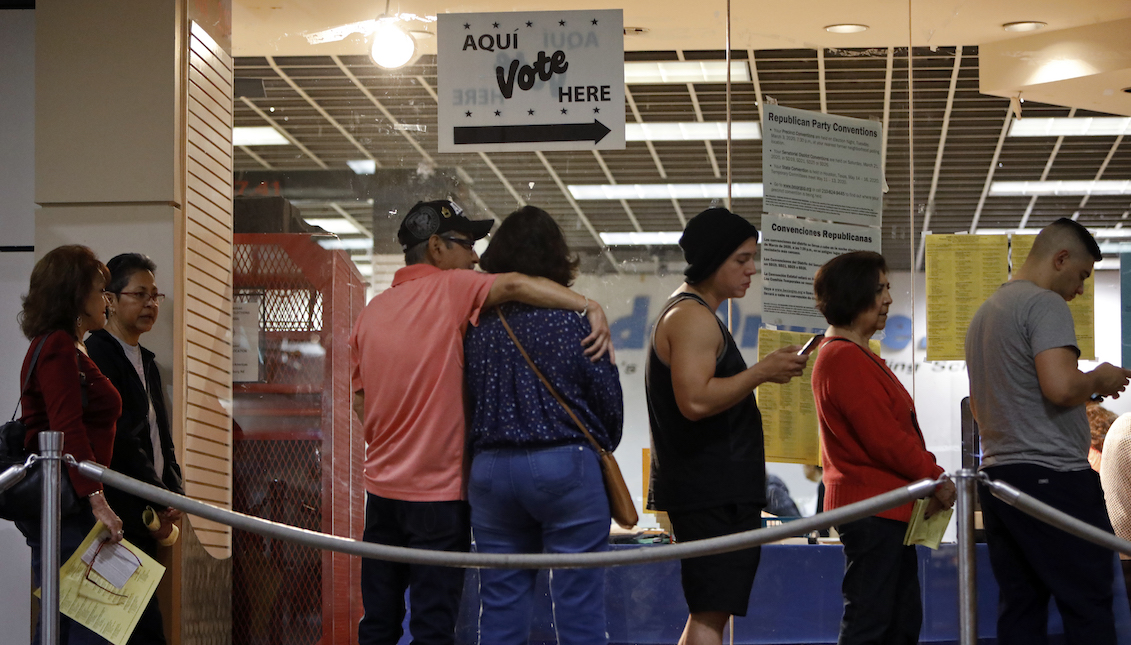
The risk of continued voter suppression in the 2020 Elections
Many voters had to wait up to six hours to exercise their right during Super Tuesday. Is the suppression of votes still in effect?
On March 3, the entire country saw the national political scene take shape from the Democratic Primary, where states like Alabama, Arkansas, California, Colorado, Maine, Massachusetts, Minnesota, North Carolina, Oklahoma, Tennessee, Texas, Utah, Vermont, and Virginia gave candidates a bulk of the delegates needed to move closer –or further– to the presidential nomination.
This was not only about millions of votes but about a key challenge for the Democratic National Committee's organization, which had to prove itself equal to the risk to democracy.
The result left much to be desired.
Between failures in the electronic voting system and the inability of the voting centers to receive the mass of voters, the elephant in the room was again the reality of the suppression of votes, still in force in the country.
It seemed like a return to the Miami of 1997 when hundreds of voters were "purged" from the voting lists after their names were "strangely similar" to those of convicted criminals who were not eligible to vote.
Worse even, it was a symptom of the persistence of endogenous racism in the United States.
As reported by CNN, several voters in states such as Texas –many of them curiously of color– "waited in huge lines" to vote in the Democratic primary on Super Tuesday, “reminding the nation of the high cost of the Supreme Court's 2013 Shelby v. Holder decision to repeal voting rights enforcement”
The media refers to the Supreme Court's decision to allow jurisdictions with a history of suppressing minority voters to prevent them from continuing to meet federal pre-clearance requirements for voter registration and voting changes.
In the state of Alabama, with a strong African-American population, the Court's decision gave the green light to a state law passed in 2011 that required voters to present a specific type of photo ID. The governor then resorted to strategies such as the early closure of the Department of Motor Vehicles offices in eight of the ten counties with the highest percentage of color population.
In fact, in 2016, Alabama Secretary of State John Merrill began the process of requiring proof of citizenship from voters.
This ruling "has produced total chaos" in recent elections such as the Democratic Primary where "people lined up for more than five hours to cast their ballots, long after the polls had officially closed.”
“These long lines to some extent indicate unexpectedly high voter turnout -- but they also evoke statewide efforts at voter suppression that have gone unabated since 2013,” CNN added. “In Texas, at least 750 polling places have been closed since then, forcing many predominantly black and brown people to travel longer distances to exercise their citizenship rights.”
For Zachary Roth, a fellow at the Brennan Center for Justice and author of The Great Suppression: Voting Rights, Corporate Cash, and the Conservative Assault on Democracy, what happened in Texas on Super Tuesday is part of the Republican strategies "to make it harder for racial minorities and students to vote," he told Newsweek.
RELATED CONTENT
As these states become “increasingly diverse” –especially with the exponential growth of Latino communities and communities of color– the risk for Republicans is that they will lose control of the historically "red" South.
"[Texas Republicans] passed a very strict voter ID bill that was found by a federal court to be racially discriminatory," Roth said. "They made voter registration more difficult by imposing all of these rules on voter registration groups to make it harder to go out and register new voters. There's just been a concerted effort."
However, the Democratic leadership does not seem to want to stand idly by.
"It's time to fight back," wrote Democratic minority leader Chuck Schumer and former Georgia Democratic gubernatorial candidate Stacey Abrams in an opinion piece published in Black Press USA.
“It is from the right to vote that all our other rights as Americans derive,” the Democrats wrote. “And today, in 2020, that fundamental right to exercise the franchise is being challenged and, in many cases, eroded, in states across the country.”
Recalling the 1965 civil rights struggle, the passage of the Voting Rights Act, and the setback involved in Shelby County v. Holder, Schumer and Abrams draw a line between democratic gains in equal rights and the Republican effort to impose “a wave of new laws designed to limit access to the ballot box, including a new photo-ID requirement, drastic cuts to early voting, and the end of same-day registration.”
In short, for Schumer and Abrams, the focus of the 2020 elections, beyond access to health care, immigration and finally defeating Donald Trump, is precisely the fight for the right to vote.
“Voting rights are not a Democratic issue or a Republican issue,” they concluded. “But until that day comes, candidates up-and-down the ticket, leaders at every level of government, and above all, the American people, must make voting rights a priority in this election.”











LEAVE A COMMENT:
Join the discussion! Leave a comment.